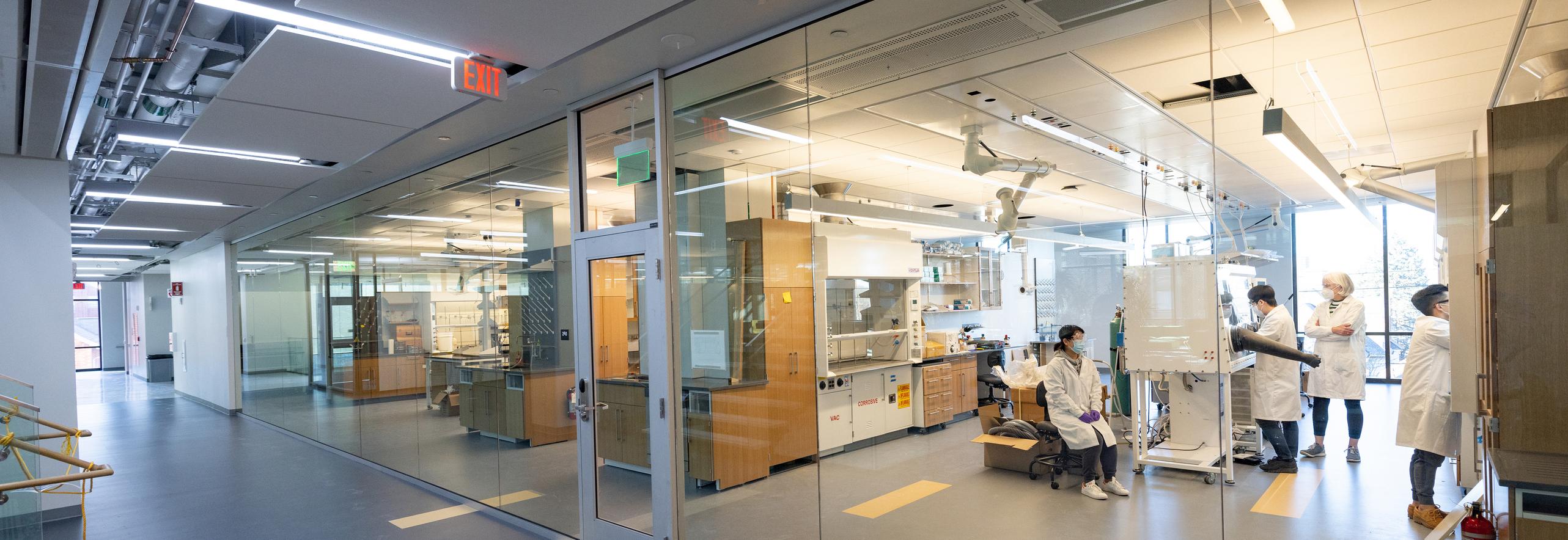The College of Health Leading-Edge Facility
The revolutionary Health, Science and Technology (HST) building is home to a number of leading-edge resources including a Data Warehouse, an Artificial Intelligence and Data Visualization Laboratory, a Community Partnership space and more.
About the Building
The new home of Lehigh’s College of Health (COH) —the largest academic facility built at Lehigh in more than a decade and the first new building in 50 years — is the nexus for innovation in population health education, research and partnerships.
Opened in January 2022, the 195,000-square-foot facility houses COH faculty, administrative and programmatic staff, wet and dry labs, and community resources. Along with the College of Health faculty, the building houses engineering and science faculty from Lehigh's other colleges who work on health and energy. The building's open, collaborative design fosters an atmosphere of constant innovation and change. Interdisciplinary teams rotate in and out of the space while undergraduates engage in high-impact, hands-on learning experiences working alongside graduate students and faculty researchers.
This community-facing space redefines innovation by providing a home for Lehigh to forge important new partnerships with local organizations, schools and churches.
Moving in to HST
In January 2022, the first group of faculty, staff and graduate students moved into their new spaces in the HST building.
Constructing HST
View webcam footage of the Health, Science and Technology building, Lehigh’s largest on campus.
Health Data Warehouse (HDW)
A collaboration between the College of Health and Lehigh Business, the HDW is an invaluable resource for faculty and students engaged in data analytic health research across Lehigh University. Through partnerships with industry, government, nonprofits and peer academic institutions, the HDW holds substantial repositories of data related to health and healthcare, which it makes available for research use.
Biospecimen Repository
Modern techniques in molecular biology including -omic analyses opened new avenues for examining the cellular and molecular determinants of health. The Biospecimen Repository enables human biospecimen collection and processing, and subsequent storage and analysis of biological markers for research in precision medicine. The HST building is home to a tissue processing laboratory and freezer room for mechanical and liquid nitrogen freezers to accommodate scalable collection of biospecimens for population health research. The biospecimen repository is a key resource to support the cohort studies and the implementation of analyzing multiple integrated -omic assays combined with self-reported and electronically ascertained health information (claims and electronic health records).
The Data Visualization Laboratory
The Data Visualization Laboratory (DV) occupies 700+ square feet in the HST building. In support of the research and teaching missions of the COH, the DV lab showcases technologies for faculty and student researchers and their external partners. As technology advances, the DV lab will develop training and consulting services to disseminate information about new tools, support integration of new technologies into coursework and facilitate partnerships that link faculty and students with external resources for new and useful tools.
Survey Research Laboratory
The HST building includes space for primary data collection from focus groups, in-person, technology-assisted interviews and remote data collection. With this space, faculty, students and project staff can obtain rigorous qualitative, mixed-methods and quantitative survey-based data collection.
Community Partnership Engagement Space
The HST building has dedicated community space allowing community partners and members to interact with faculty, students and staff. The COH is committed to improving the health of our community through partnerships with nonprofits, healthcare providers, community leaders and local businesses.
Open Plan Wet and Dry Lab Space
Flexible, open laboratories accommodate immediate expansion and contraction of research groups with minimal disruption. The open-lab zones house wet programs for chemistry and chemical engineering; damp labs for life-science research; and dry zones for prototyping and fabrication. The lab zones are situated adjacent to the computational research labs within the building’s open office work area.
